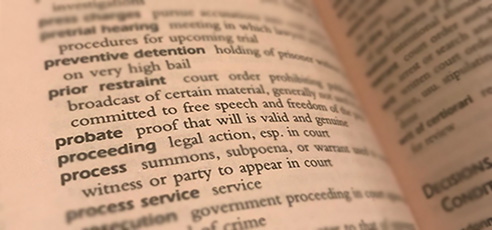The probate process in Texas is often misunderstood. The term “probate” simply means the court-supervised process for handling the estate of a deceased person. Probate includes paying off any debts, expenses, and taxes, and the distribution of any remaining property according to the Will (if a valid Will exists) or to the heirs under Texas laws regarding intestacy (“intestacy” means no valid Will exists). It is important to note that, under Texas Estates Code Section 256.003, a Will must be filed for probate within four years after the death of the testator (the person who made the Will). After four years, a Will may be filed as a “muniment of title” if the applicant is not “in default”.
Initial probate steps
If there is a valid Will, the first steps in beginning the probate process often include the filing of the Will with the court and an application seeking the appointment of the executor named in the Will. If there is not a valid Will, probate may instead begin with a petition to the court to determine who are the heirs of the deceased person’s estate. The heirs in an intestate estate may also seek the appointment of an administrator (who administers the estate like an executor).
Non-probate assets
Not every estate requires probate. The probate process only applies to assets that do not pass by beneficiary designation or are not owned jointly with a right of survivorship. If the only assets in the estate are life insurance, retirement accounts, or bank accounts with beneficiary designations, then no probate would be required for the beneficiary listed on such accounts to receive his or her interest in those assets. With married couples, assets are often held in this manner so that many of the assets pass directly to the surviving spouse upon the first spouse’s death, therefore probate may not be required. These types of assets that pass without the need for court supervision are often referred to as “non-probate assets”.
Risks of skipping probate
One risk of failing to settle an estate is that assets cannot be properly transferred to others, resulting in a cloud on title. In particular, one often-ignored risk of not completing the probate process upon a spouse’s death is the failure to get clear title to the couple’s primary residence into the name of the surviving spouse. After the second spouse dies it may be necessary to go through the probate process for the estates of both spouses to clear title to the home for the heirs or beneficiaries. Or, if a surviving spouse attempts to sell the home, a title company usually will not proceed with a sale until the probate issues are straightened out regarding the deceased spouse’s estate.
There are other risks associated with skipping probate. For example, waste of estate assets can be caused by failing to use the estate assets to keep up with mortgage payments or failing to take advantage of rules for dealing with debts through probate.
Texas intestacy laws and blended families
As mentioned above, intestacy is the term for when a person dies without a valid Will. Texas has some of the most streamlined probate processes of any state, but failure to have a valid Will (or failure to properly complete beneficiary designations) can give probate a reputation for creating hardships when blended families or children from a prior marriage are involved. Under the Texas laws regarding intestacy (in particular, Texas Estates Code Section 201.003), if a spouse dies without a Will and the deceased spouse has children that are from a prior marriage, then the deceased spouse’s one-half share of community property will be divided among the deceased spouse’s children and not pass to the surviving spouse.
When a spouse in a blended family fails to have a Will, it can be devastating where the primary or sole marital asset is the home. If the deceased spouse’s interest in the primary residence passes to children instead of the surviving spouse, the surviving spouse can assert homestead rights under the law allowing him or her to continue to reside in the home. But, this will be little comfort if the surviving spouse had planned to sell the home to provide for long-term care needs and is only entitled to one-half of the proceeds. A valid Will is essential to avoiding such probate complications.
What if the estate is small?
Probate may seem like an unnecessary burden if there are few assets in the estate. In such cases, an estate may qualify for simplified or informal probate processes that exist under Texas law. For example, when a person with a small estate dies without a Will, one options that is available is called a “small estate affidavit”, which only applies if: (i) the deceased person died without a Will and (ii) his or her Texas probate estate, not counting a homestead or exempt property, is valued at $75,000 or less.
Attorney fees myth
There is an oft-repeated misunderstanding that all probate attorneys are entitled to a cut or percentage of the estate assets passing through probate. This confusion then leads to advice by non-attorneys to their clients or friends to avoid probate at all costs. While some states do set attorneys fees according to a percentage of the estate’s value, that is simply not the case in Texas. Attorneys in Texas commonly bill hourly or set flat rates for advising an executor or beneficiary, but there is no law in Texas that guarantees a probate attorney a fee based upon the value of the estate. Accordingly, where an estate does not involve litigation, the costs for the probate process may be very minimal relative to the value of the estate.
An experienced probate attorney can further explain the process to you, assist you with preparing the necessary documents for probate, and make court appearances. To learn more, please visit our website at www.tarletonfirm.com or call us at (214) 935-9004. Although we are located in Dallas, we serve clients all over Texas.

